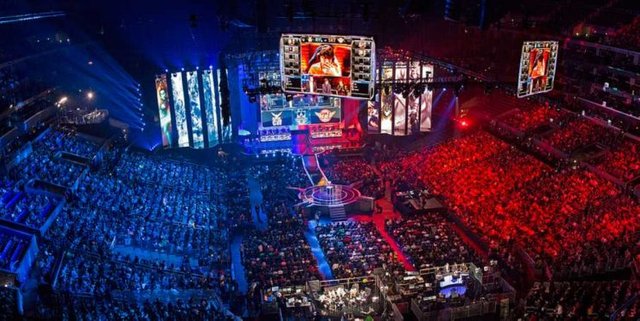The Business Challenges of Sport: Towards a Professionalisation?

The professionalisation of the eSport comes from a triple conjunction. Non-endemic brands want to touch the young audience of millennials, fond of tournaments. Media such as Canal +, beIN Sports or SFR3, aspire to capture some of the online dementia. Finally, sports clubs want to diversify their activities, reaching out to new audiences or even new territories.
ESport: figures that give the spin
At the beginning of the year, the research company Newzoo published a report estimating to 590 million the number of spectators turned on the eSport to 2020 (against 323 million in 2016). More importantly, the turnover of this fast-growing sector is growing faster than the audience, rising from $ 500 million in 2016 to $ 700 million this year, to around $ 1.5 billion in 2020 The most dynamic market is in Asia ($ 328 million), thanks in particular to the importance of South Korea, the heart of the nuclear reactor technological innovations. Asia is ahead of the United States and Europe, which generate around $ 300,000 million each.
Where do these revenues come from?
By discounting the amounts brewed in the context of sports betting, the resources result from TV rights, advertising, sponsoring, merchandising, ticketing or Game Publisher. According to Newzoo, in 2020, TV rights, advertising and sponsorship will account for 82% of eSports revenues. Coca-Cola, Lagardère, Sncf, Twitter, Gilette, Redbull, Orange and so on, are all attracting more and more diverse players. The Chinese giant Alibaba has recently partnered with the international eSport federation via its subsidiary Alisport for $ 135 million.
Brands look on the huge fan community
According to data collected by SuperData, the European eSport market brings together a community of 23 million fans. The annual growth rate is 14%. The interest for brands and sponsors is the profile of the fans. They are mainly men (78%) but mainly young people: 18-24 years (30%), 25-34 years (30%). In France, the community is even younger than in the rest of Europe: 13-17 years (19%), 24 years (33%). In terms of business, a French fan would generate $ 16 / year on average. Precisely, millennials are at the center of marketing strategies in order to approach prospects not always easy to tame.
And millions of viewers are flocking to the Twitch platform (bought 1 billion euros per Amazon) to attend the League of Legends (LoL), Counter-Strike, Dota 2 and Hearthstone games. The League of Legends world championship was watched by 43 million people at least a few minutes last year. In France, the eSport on Twitch has caused 20 million hours of streams (October 2016), that is 1h15 per day and per viewer! In April 2017, the most watched TV websites on Twich were those of Arma Team (2.34 million hours), Eclypsia (1.83 million hours), the Aiekillu streamer (1.71 million Hours) and O'GamingLol (1.60 million hours). As a result, gamer salaries are rising. "Faker" the Korean star of LoL would have exceeded 1 million euros of annual income. In 2015, the Dota 2's prize money climbed to $ 18 million in earnings, partly funded by the game's fans through the purchase of virtual items.
Convergence between sport and eSports
Many football clubs have created their eSport structure (Schalke 04, Besiktas, Vlf Wolfsburg, West Ham, Manchester City, etc.). Now, professional sportsmen and women are investing in the sector like the NBA star Shaquille O'Neal. In France, the Alpha Republic of esports project (ARES) is attracting attention: organizing tournaments around the world to recruit future eChampions. Among the partners, two are the owners of the company BSZ Consulting which pilots the image of several footballers. The project can count on prestigious ambassadors such as Riyad Mahrez, N'Golo Kanté, Moussa Sissoko, Wendie Renard and Yannick Carrasco.
In addition to the convergence of actors, the connection is also made at the level of sponsorship. This is the case with Orange who wants to be the "equipment maker" of sportsmen like Adidas or Nike are in the traditional sport. It is the entry point of the brand whose goal is to promote fiber by reaching out to a young audience. The operator relies on the legitimacy that stems from his experience in the world of football, advocating an identical model to invest in eSports.
Other actors do the opposite, invoking the same strategy. This is the case of Asus (PC components and peripherals designer) who is a historical sponsor (creation of the Republic of Gamers in 2006). Now partner of the PSG eSports, the idea is to reach the fans of traditional football. Note that hardware manufacturers are very present in eSports: Nahimic Audio (audio software), Shadow (cloud computing), KLIM (gaming peripherals), and so on.
However, the rise of eSports is hampered by the conflict between video game publishers, intellectual property owners and players' associations. This confusion blurs the visibility by multiplying the competitions. Sponsors are therefore reluctant to project themselves over several years. On the positive side: in France, the decree on the status of professional gamblers in competitive video games was implemented on 1 July 2017.

The problem for average fans with esports is, they keep updating the game. If you don't play for a while, you are aware of the changes.
They make money from players. Most esports competition tournaments initially were operating for loss, I don't know how it is now.
Usually esports fans are fan of one game.
yeah i think so :)
Game sports - goes to development! Many states take it to schools and universities as an academic discipline. Many investors are ready to buy and create schools of gamers!
The growth of esports is fascinating! I write about Overwatch esports here in NA. It is about to have explosive growth here. See you around
@dwelling
thanks for your reply